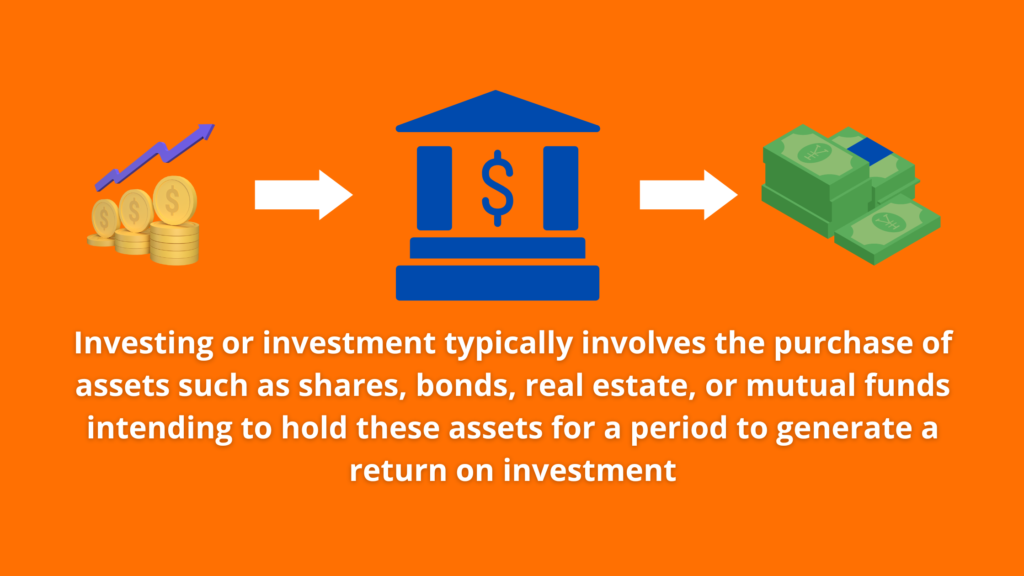Investing is the process of committing money or capital to a business in the hopes of generating extra revenue or profit. So, what is an investment?
Investing or investment typically involves the purchase of assets such as shares, bonds, real estate, or mutual funds intending to hold these assets for a period to generate a return on investment.
Several different strategies can be employed when investing, and the type of strategy used will usually depend on the investor’s goals and objectives. For example, some investors may aim to generate a high return on investment, while others may focus on preserving their capital.
Investing can be a risky business, and there is always the potential for loss. However, by carefully choosing the right investments and managing them carefully, it is possible to minimize the risks and maximize the profit potential. Read more to find out “how an investment works?”
What types of investments are there?
There are many types of investments, including shares, bonds, mutual funds, real estate, and commodities. Each type of investment has its own risk and return characteristics.
What is a share?
A share is a unit of ownership in a company or other organization. When you buy shares in a company, you become a shareholder. Shareholders are typically entitled to vote on matters affecting the company, and they may also be entitled to a share of the company’s profits.
What are mutual funds?
A mutual fund is an investment that combines money from a number of people and invests it in a variety of securities, such as stocks, bonds, or short-term instruments. The advantage of investing in a mutual fund is that it provides diversification, which spreads your investment dollars around to different asset types and companies to minimize risk.
When you invest in a mutual fund, you are essentially buying into a portfolio of investments, which a professional fund manager manages. The fund manager is responsible for making investment decisions and monitoring the fund’s performance.
How does investing work, and what are some key concepts about it?
When you invest, you’re basically investing your money into something with the hopes of seeing it increase over time. This can be done through various investments, such as stocks, bonds, and mutual funds. There are a few key concepts to keep in mind when investing:
– Risk: All investments come with some degree of risk. The higher the risk, the higher the potential return (and vice versa).
– Diversification: This refers to investing in a variety of different asset types to mitigate risk.
– Time horizon: This is the length of time you are willing to invest. Short-term investors typically have fewer than 5 years, while long-term investors have a time horizon of 10 years or more.
– Return: This is the amount of money you expect to make on your investment. There is no guarantee that you will earn a return on your investment, but diversifying and investing for the long term can help increase your chances of success.
How do you choose the right investment option for you?
When it comes to investing, there are many different options available. It can be difficult to know which type of investment is right for you, but some general guidelines can help.
The first step is to decide what your goals are. Are you more concerned with accumulating money over time than with creating income? Once you’ve established your objectives, you may begin to consider various investing possibilities.
For example, if you’re looking to grow your wealth, investing in stocks or mutual funds may be good. These types of investments tend to offer higher returns over time, but they also come with more risk. If you’re more interested in generating income, bonds or real estate may be better. These investments tend to offer lower returns, but they’re also much less risky.
Once you know your goals, you can start to look at different investment options and decide which one is right for you. There’s no perfect answer, but by doing your research and understanding your options, you can make an informed decision that will help you reach your financial goals.
Tips for beginners who want to start investing?
1. Start small and gradually increase your investment over time.
2. Decide what you want to achieve with your investments and set realistic goals.
3. Consider using a financial advisor to help you get started.
4. Do your research and don’t blindly follow investing advice.
5. Be prepared to hold your investments for the long term.
6. Review your portfolio regularly and rebalance it as needed.
7. Stay disciplined and avoid making emotional decisions.
8. Avoid excessive fees and taxes.
9. Be patient and don’t expect immediate results.
10. Understand that there is risk involved with investing in finance.
11. Have realistic expectations and be prepared for losses and gains.
Investment vs. Savings: What’s the Difference?
When it comes to managing your finances, it’s important to understand the difference between investing and saving. Both are important, but they serve different purposes.
Savings
Savings are money you set aside for a specific purpose, such as an emergency fund or a down payment on a house. You typically don’t expect to earn a return on your savings, but the goal is to keep the money safe and accessible.
Investment
On the other hand, investing is when you put your money into something with the expectation of earning a return. Common investments include stocks, bonds, and mutual funds. There’s always some risk involved with investing, but the potential for rewards is also higher.
So, which one is right for you? It depends on your goals and your timeframe. If you aim to reach a financial goal in the short term, savings are usually the best option. But if you’re investing for the long-term, investing can be a wise choice.
No matter what you decide, it’s important to have a mix of both savings and investments. That way, you can have the security of savings plus the opportunity for growth with investing.
What should you watch out for when investing, and how can you protect yourself from scams or bad investments?
There are a few key things you should keep in mind to avoid being scammed or making a bad investment when it comes to investing.
- First and foremost, do your research! It’s important to know as much as you can about the company or individual you’re thinking about investing with. This includes reading reviews, researching their financial history, and understanding the risks involved.
- Another important thing to keep in mind is to diversify your investments. This means not putting all your eggs in one basket. You’re less likely to lose everything if one investment goes bad by spreading your money around.
- Finally, don’t let anyone pressure you into making an investment decision. If someone is pushing you to invest in something, walk away. A good investment should be something you feel comfortable with and are confident in. If you’re not, then it’s probably not worth your money.
You can help protect yourself from being scammed or making a bad investment by following these tips. Just remember to do your research, and don’t let anyone pressure you into anything!
How Many Individuals Invest In The Stock Market In India?
According to statistics from the National Stock Exchange (NSE), India has 1.2 crores, of current investors, as of August 2021, which is an improvement over previous numbers but not enough to say this practice has become more widespread!
Final Words
Investing can be a great way to grow your wealth over time, but it’s important to understand the different types of investments and the risks involved. Start by deciding your goals, and then look into different options. Be sure to diversify your investments, and don’t let anyone pressure you into anything. With a bit of research and patience, you can be on your way to achieving your financial goals.

Pardeep is the founder and editor of Small Investment Ideas. He believes that everyone can change their life with the help of small investments and achieve financial freedom.


